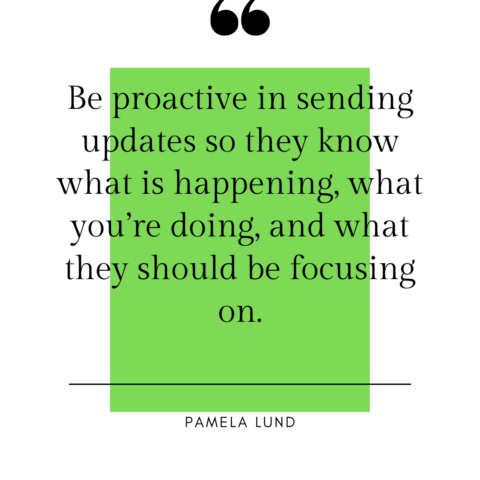06 Apr What to Do When Clients Push Pause on Your Services via @casieg
If you work at or have ever worked at a marketing agency, you know how quickly things can change.
Budgets shift, campaigns evolve, companies are acquired, and our job as agencies is to adapt as quickly as possible.
We plan what we can and go from there.
However, living through the past few weeks has really shown that no matter how much we plan, we can’t account for everything. And that takes me to this week’s post.
As business grinds to a halt across the globe, companies are pausing their marketing efforts.
In fact, when I asked Twitter how many people had paused clients, I got a pretty significant number of replies and messages.
Excuse me…
Has anyone had clients pause programs in the last week? If so, I'm writing an article and would love to ask you a couple questions.
Thank you!
— Casie Gillette (@Casieg) March 26, 2020
We can’t prevent companies from pausing their efforts but there are certain things we can do to deal with it and move forward.
Let’s take a look.
1. Provide Support Where Possible


In a different time, providing support to a non-paying client might seem absurd.
We don’t work for free, after all.
These aren’t normal times, however.
Many of us just want to help where we can.
In fact, when I asked people how they were dealing with paused programs, a small number noted they were still providing these clients their full attention.
While not everyone can offer full support, there are ways to help.
Consulting
For some of my paused clients, we are still offering consulting as needed.
For example, if they have questions on outstanding recommendations or just general marketing questions, we let them know we are happy to help.
According to Scott Benson, Founder, Benson SEO, they are doing something similar.
“We consult on their advertising programs, and for the next few months we’ll scale that back to an absolute bare minimum where we’re providing a few hours of strictly strategic planning and listing tactical optimizations to put in place for the month.”
In other cases, this might mean only monitoring results.
Andrew Goodman, Founder, Page Zero Media, said that while they weren’t offering on-going support, “We are doing a bit of monitoring and tying up loose ends.”
At KoMarketing, along with consulting, we have provided clients a list of action items they can do on their own time to ensure progress continues.
Upgrades
Does your company offer different packages?
Perhaps you can upgrade clients considering pausing.
That’s the tactic John Peterson, President, Develare, is taking.
“We are providing free upgrades to more powerful lead generation packages. For example: Moving from a Google Smart Search campaign to a full-blown Google Search campaign at no extra cost, even though our reporting and tool costs go up.”
Upgrades are a good way to keep clients onboard and support them during this time.
Identify Free Opportunities
One thing I love about the SEO community is their willingness to step up and help others.
This crisis is no exception. I have seen multiple people offering to provide free consulting.
Running a small business? Starting a small business? Moving an offline business online? Working in the gig economy? Give me a call for free content marketing, SEO or conversion rate optimization advice. Doing an hour daily.
Schedule a call: https://t.co/vQHbRDidau
Pls retweet.
— Shanelle Mullin (@shanelle_mullin) March 23, 2020
Even some of the tools like Moz are offering free access to their training courses:
As of now, all premium SEO training courses at Moz Academy are 100% free. A small thing, but we did this to help:
• SEOs become more marketable in the workforce
• Businesses with Local SEO
• Agencies get more leadsUse code "wegotthis" (through 5/31) https://t.co/PlKVfWjFhrpic.twitter.com/XyF1ejJ9QB
— Cyrus (@CyrusShepard) March 23, 2020
There are plenty of companies offering help and if you can’t help your paused clients, perhaps you can point them in the direction of someone who can.
2. Optimize Budgets
One of the biggest things you can do is optimize budgets, both for your clients and for your own business.
For example, if a client wants to pause campaigns, find places to cut costs instead.
Benson noted this can be done by cutting out meetings or reporting:
“Account management like bi-monthly calls will come to a stop, and reporting will rely on automated dashboards we created for them previously.”
Also, think about where you can cut nice to haves. Joe Youngblood says:
“My biggest tip is to cut every single ‘nice-to-have’ like extra SaaS tools that might only get used once every few weeks or months. If you have a separate office immediately reach out to your landlord and request a rent deferral. Depending your state, they may not be allowed to charge you as the crisis deepens. Look at your personal monthly costs and workout how to reduce or postpone those.”
Mark Lewis, Founder, Netalico, noted something similar:
“Operate as lean as possible and let your clients know you’ll be there for them whenever they can resume normal operations or in a limited capacity in the meantime.”
We are all being faced with tough choices and ensuring budgets are optimized is imperative.
3. Be Flexible


When it comes to digital marketing, flexibility is key to success.
Good marketers know you have to adapt to the changing landscape and adjust based on results.
Right now, that is more important than ever.
If a client is thinking of pausing services, think about what else you can offer them.
Pamela Lund, Owner of That Pam Chick, and PPC expert, says:
“Offer value in different ways so you stay important to your clients. For example, if you manage PPC for a client that is struggling but you can do email marketing and they need help with that, pivot to helping with email. Be creative with what services you can provide to fill a need, either to keep getting paid or just to keep them afloat so they can afford you again in the near future.”
Jason Brown, Search Analyst, Sterling Sky, had the same idea:
“We have switched out some of our services. We replaced their PPC spend and directed it into email marketing. We are helping them place more emphasis on areas that will help them to make money.”
What about financial flexibility?
If you have the means, this is one of the best options.
Megan Swiderski, Senior Web Coach Manager, BxB Media, says they create websites for small businesses and are offering options where they can.
“We’ve said you can pause payment for 30 days and catch up overtime later or drop down to pay very minimally just for us to leave your website up so you can still connect with clients.”
This may not be feasible for everyone but it certainly can help.
4. Communicate
When a client says they need to pause or cancel their program, it’s easy to shut down.
The thing is, communication can go a long way toward keeping that relationship or even rebuilding it down the line.
Greg Finn, CMO, CypressNorth, shows just how powerful communication can be.
“Start the conversations, check-in early and be overly active in working with your clients. A key is trying to find out why someone is concerned and what the actual problem is. We had a client that seemed like a cancellation was inevitable. However, we had a good conversation that uncovered one specific department couldn’t find the funds to renew at the current level. We ended up drawing out the timeline of a current project and they found ways to use a different department at said company to secure a smaller contract. Overall, this flexibility should lead to a better relationship down the road.”
Lund agrees:
“Communicate more with your clients right now. Be proactive in sending updates so they know what is happening, what you’re doing, and what they should be focusing on.”


As marketers, it’s our job to communicate and make sure we are offering clients the best possible information.
It’s also our job to be honest.
If it’s in the best interest of the client’s business to pause, we need to communicate that.
John Short, Founder, Compound Growth Marketing, states:
“Many have pulled back on paid, but we are still working with them on SEO and analytics. I think in many industries it’s wise to be pulling back spend. I hope agencies are honest with their clients with how they think they should be pulling back.”
5. Be Understanding
No one wants to hear their client will no longer be continuing but, in this environment, we have to be a bit more understanding than we would normally be.
It’s important to remember that we are all going through this.
Swiderski says:
“Try to have as much compassion as possible and realize people are scared right now. Having kindness and compassion for people during this time can go a long way.”
The same thing applies to internal decisions.
Many agencies are having to make tough choices, including laying off employees.
As Zach Mettra, Founder, Bright Oak, found, we also have to be understanding with ourselves:
“Be kind to yourself. It’s not your fault. There is nothing you could have done. It took me about a week to come to peace that it was entirely out of my control. My number one job right now is to try to keep the company afloat for as long as possible so that when the storm dies down there is still a boat for everyone to get back on to. Survivor guilt is very real.”
Whether you are dealing with client programs, team members struggling with this new normal, or working through your own decisions, try to be understanding.
6. Think Long Term
It can often be hard to find the light at the end of the tunnel and for many of us, one of the biggest challenges right now is the uncertainty.
A number of people I talked to mentioned trying to focus on the long term.
A well-known digital marketing expert who wanted to stay off the record told me their agency’s main goal right now is distilling the firehose of information coming in into something valuable for their brands.
- What is happening in the industry?
- What is happening to the brand?
- What do they need to do to respond?
All of these things are not just geared for the now but helping companies get through this.
Others I asked made mention of SEO as a long-term play.
Perhaps the client is paused right now but they will be back when they can.
By supporting clients as much as we can, by being understanding, or by offering flexibility, you are showing that you care and hopefully that will pay off down the road.
7. Find Support
I wanted to end with this one because I thought it best exemplified the search industry.
Hardik Oza, SEO Practitioner, told me:
“People are always ready to help each other without any expectations. Building a network of people who can support you is a key element during this pandemic. Every worker/freelancer must connect with an industry person who can support you in a tough time. Recently, I tweeted about the work which had been stopped. After that, one of industry experts DMd me and gave some support.”
I’ve also seen plenty of people offering to chat, jobs being posted, and general encouragement all around.
We have an amazing community and if you find yourself needing support, there are plenty of people out there willing to help.
Final Thoughts
Clients pause programs all the time and while the tips provide above will most definitely apply, they are certainly geared toward the now.
I hope you find these helpful and I encourage everyone to stay safe and I am looking forward to what the future brings.
More Resources:
- 5 Tips for Managing PPC During the Coronavirus Outbreak
- Working with SEO Clients: Strategies for Now & After COVID-19
- SEO After COVID-19: 8 Opportunities to Start Working on Now
Image Credits
In-Post Image #1:Lukas/Pexels
In-Post Image #2: evondue/Pixabay
All screenshots taken by author, March 2020
Sorry, the comment form is closed at this time.